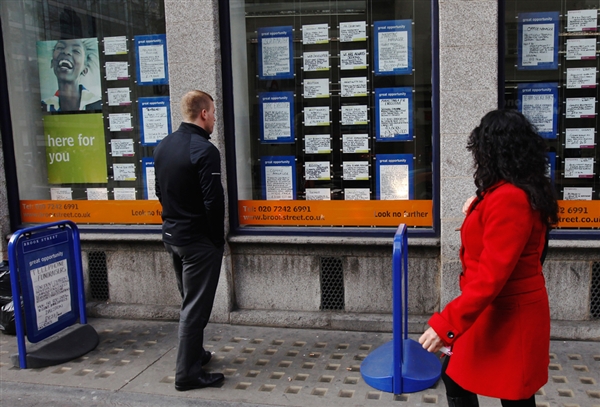
1,000 suicides linked to hard economic times in Britain?
NBC News wire services

© Luke Macgregor / Reuters / Reuters, file
A man looks at advertisements posted in the window of a recruitment agency in London on March 14, 2012. Britain's economy has shrunk for the last nine months and now produces 4.5 percent less than before the economic crisis.
LONDON -- A painful economic recession, rising unemployment and biting austerity measures may have already driven more than 1,000 people in Britain to commit suicide, according to a study published on Wednesday.
The study, a so-called time-trend analysis which compared the actual number of suicides with those expected if pre-recession trends had continued, reflects findings elsewhere in Europe where suicides are also on the rise.
"This a grim reminder after the euphoria of the Olympics of the challenges we face and those that lie ahead," said David Stuckler, a sociologist at Cambridge University who co-led the study, published in the British Medical Journal (BMJ).
UK slides back into recession in first double dip since 1970s
The analysis found that between 2008 and 2010 there were 846 more suicides among men in England than would have been expected if previous trends continued, and 155 more among women.
Between 2000 and 2010 each annual 10 percent increase in the number of unemployed people was associated with a 1.4 percent increase in the number of male suicides, the study found.
The analysis used data from the National Clinical and Health Outcomes Database and the Office of National Statistics.
In debt or jobless, many Italians choose suicide
Stuckler, who worked with researchers from Liverpool University and the London School of Hygiene and Tropical Medicine, stressed while this kind of statistical study could not establish a causal link, the power of the associations was strong. Its conclusions were strengthened by other indicators of rising mental health problems, stress and anxiety, he added.
Hundreds of anti-austerity protesters in Greece have been remembering one of their own. In front of the parliament in Athens, a 77-year-old retired pharmacist killed himself. In a note he said government cuts wiped out his pension and robbed him of his dignity. ITV's Martin Geissler reports.
He also pointed out the study showed a small reduction in the number of suicides in 2010 which coincided with a slight recovery in male employment.
A survey of 300 family doctors published by the Insight Research Group on Tuesday found that 76 percent of those questioned about the effects of the economic crisis said they thought it was making people unhealthier, leading to more anxiety, abortions and alcohol abuse.
After Olympics boost, Britons face austerity until 2020
Data this month from the government's Health and Social Care Information Centre showed the number of prescriptions dispensed in England for antidepressants rose 9.1 percent in 2010.
A study published last July, also by Stuckler, found that across Europe, suicide rates rose sharply from 2007 to 2009 as the financial crisis drove unemployment up and squeezed incomes.
The countries worst hit by severe economic downturns, such as Greece and Ireland, saw the most dramatic increases in suicides.
'Martyr for Greece': Retiree's suicide sparks violent protests
In Britain, there's little doubt times have been getting harder. The economy has shrunk for the last nine months and now produces 4.5 percent less than before the economic crisis.
Great Britain has been struggling to find a way to recover from a deep double-dip recession. Could recovery be sparked by the Olympic Games? NBC's Stephanie Gosk reports.
Government debt is well above a trillion pounds and is predicted to rise above 90 percent of GDP even with austerity policies being pushed through by the government.
'The country is on its knees': Ireland grapples with economic collapse
Many Britons have had the worst squeeze in living standards for 40 years and the crisis has hit young people hard, with youth unemployment soaring above 20 percent.
'Income, status, importance'
Stuckler's BMJ study found that the number of unemployed men rose on average across Britain by 25.6 percent each year from 2008 to 2010, a rise associated with a yearly increase in male suicides of 3.6 percent.
"Much of men's identity and sense of purpose is tied up with having a job. It brings income, status, importance..." Stuckler said in a telephone interview.
"And there's also a pattern in the U.K. where men are three times more likely to commit suicide than women, while women are much more likely to report being depressed and seek help."
Spain's economic crisis turns middle-class families into illegal squatters
The World Health Organisation estimates that every year, almost a million people die from suicide -- a rate of 16 per 100,000, or one every 40 seconds.
The U.N. health body also estimated that for every suicide, there are up to 20 attempted ones.
New figures released on Tuesday also showed that Europe is edging closer to recession, dragged down by the crippling debt problems of the 17 countries that use the euro.
"Things are getting worse and worse in Greece. There is no future for the next few years there," says Christos Christoglou, a Greek inspection engineer, who moved to Germany to find work.
'It is virtually impossible to find a job': Brain drain is new Greek tragedy
Eurostat, Europe's statistics agency, said that the economies of both the eurozone and the European Union, which has 27 countries, shrank by a quarterly rate of 0.2 percent in the second quarter of the year. In the first quarter, output for both regions was flat.
"Austerity measures are sending us into poverty," said Armando Farias, executive committee member of the Confederation of Portuguese Workers. "We need development and investment, and we can't get them this way. We need to change path. Something needs to be done, and quickly."
Reuters and The Associated Press contributed to this report.
VIEW VIDEOS
